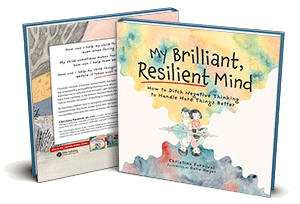Hi there! I’m Christina, a mom of two littles, a licensed mental health therapist, and a soon-to-be children’s book author! Thanks for checking out my site. Look around! I’m sure there’s something here for you! This guest article by Gladys Simen is about raise a future leader.
How to Raise a Future Leader
Every parent wants the best for their children. We can’t help but imagine our little ones achieving the highest level of their chosen profession. We envision our kids with prestigious titles such as CEO, vice president, prime minister, or even president. The sky is truly the limit whenever we think about our children’s future.
That’s why it’s so important for us to carefully consider what type of skills, values, and lessons we instill.
Even if our children don’t end up in a traditional leadership position by title, they can still be a leader, leading others by example.
If you are curious about how to raise a future leader, here are five skills that I’m teaching my own kids:
5 Skills to Raise a Future Leader
- Foster Healthy Self Esteem
One of the first things you should instill in your children is healthy self-esteem. After all, before our kids can develop into leaders and inspire others they must first believe in themselves. Children with a healthy self-esteem usually have the confidence and ambition necessary to pursue their personal goals later in life. Intrapersonally, they are also more likely to be self-reliant and independent. And interpersonally, they will understand how to maintain well-balanced personal relationships because they grew up with a positive self-image.
Our actions as parents have an influence on the way kids feel about themselves. As parents or primary caretakers, we can help develop their sense of self-worth by providing unconditional love and support very early on in their childhood. The simple act of reassuring and encouraging them will foster a safe environment and create a strong foundation where they can develop positive, affirming beliefs that they matter, are worthy, and capable. What you do today will teach them firsthand how to form a secure, trusting bond with not only you but also themselves and other people in their future. - Demonstrate Great Communication Skills
Another essential lesson you should focus on teaching your children is how to communicate properly. When they grow up and leave home, they should be able to articulate their deepest desires, needs, or goals clearly and without ambiguity when speaking to someone else as well as advocate for themselves and/or others.
You can use a variety of normal, everyday situations to help them work on their communication skills. For example, I encourage my kids to order their own meals whenever we dine at a restaurant as a family. This teaches them to think about what they want and politely ask for it with confidence. If your family doesn’t eat out very often, your child can ask store employees where a particular item is located the next time you’re out shopping with them.
It’s important to note that communication also involves good listening skills. We like to play the listening game in my household, which involves having one person talk for a full minute while the others have to repeat what they heard back to them. This definitely gives us some hearty laughs! - Embrace Failure
Teaching kids how to embrace failure can be difficult for parents, especially since we naturally want to remove as many obstacles as we can from their lives so they can succeed. However, the best leaders are resilient and aren’t afraid to fail. If you prevent your kids from striking out on their own and making mistakes, they will be unable to cope when things don’t go their way or work out as they’d originally planned.
They may also be less equipped to handle stressful situations because they’re scared of making a choice that will lead to potential failure. Try to give your kids enough space to tackle their own problems so they can sharpen their problem-solving skills. When your child makes a mistake or misbehaves, simply explain to them what they did wrong and focus on why the behavior is bad – not the child. Guide them in finding ways and options on how to mitigate the effect of that mistake or behavior going forward.
A mistake should be presented as an opportunity to reflect and recalibrate. It can be celebrated because they had the courage to attempt the unknown. Embracing failure is a great skill that teaches resiliency with hardship, even if it sucks when it happens. - Negotiate Like a Pro
Negotiating is a valuable life skill for everyone – not just leaders. The art of negotiation can improve your child’s overall self-confidence, self-respect, and sense of independence. Besides sharpening their analytical skills, practicing negotiation helps your child develop empathy as they place themselves in someone else’s shoes. They’ll also figure out how to compromise with other people by coming up with a favorable outcome for everyone involved.
Look for new opportunities to encourage negotiation with your children. Maybe you can let them negotiate what outfit they get to wear for the day. Or maybe they choose what snack they’re allowed to eat when they get hungry later on. The more you embrace allowing your kids negotiate smaller situations, the more comfortable your children will be using this skill as an adult. - Teach Emotional Intelligence and Creative Thinking
Tomorrow’s leaders will benefit from being emotionally intelligent and creative. Children are naturally creative, so you can set up activities to bring it out! Games, art projects, lively discussions, and other fun activities that center around thinking outside of the proverbial box are great. Emotional intelligence fosters empathy and sympathy, which can assist children in developing successful interpersonal relationships later in life.
You can build and nurture your child’s emotional intelligence by teaching them how to identify and correctly label their emotions. Even more, you can validate their feelings and encourage them to emotionally express themselves. All emotions are encouraged and accepted – and are a great opportunity to understand why we are feeling that particular way. We should embrace the emotions but not the bad behavior that may result from an emotional outburst. It is okay to be angry, but not appropriate to act in anger for example. And when they are playing/interacting with others, explain to them how their actions and words may affect others so they can become self-aware of the impact their words and behavior can have on different individuals.
As parents, it’s up to us to equip our kids with the skills necessary to become strong leaders. Your child will be well on their way to living a happy, productive life if you teach them to embrace failure, improve their communication skills, creative thinking, emotional intelligence, and negotiate like a pro. Please visit my blog where you can read my thoughts on many aspects of parenting life. Or schedule a free curiosity call to put in place or reinforce an existing plan to raise your future leader(s).

Gladys Simen is a life coach for moms who are trying to balance their work and family life. She is a life enthusiast who lived in 5 different countries, mastered 2 languages, and changed several professions. It took becoming a fabulous mama for her to tap into some BIG superpowers within herself. Former quiet introvert, today is passionate about helping women live big, beautiful, shooting-for-the-stars kind of lives right now. Gladys considers herself an advocate for the working mama! Visit her at My Life Couch and LinkedIn.


